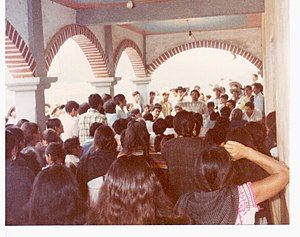User:Virginia Vázquez/Tomás Cruz Lorenzo

Tomás Cruz Lorenzo was born on December 21, 1950 in San Juan Quiahije, Oaxaca, Mexico. He was a Chatino activist who belonged to the generation of communal, indigenous thinkers, among Floriberto Díaz and Jaime Martinez. His reflections, which take on anarchist hues, are a clear call for the defense of Chatino language and culture and for the autonomy of the Chatino land that extended from the coast to the highlands of the sierra in the southeast of Oaxaca. Tomás was killed by gunmen from Santa Catarina Juquila on September 26, 1989.
Life
[edit]Tomás Cruz Lorenzo was born on December 21, 1950 in San Juan Quiahije, Oaxaca, Mexico. He was born to one of the most traditional and marginalized Chatino communities in the state of Oaxaca, Mexico. He completed some schooling, but his training began at the age of 20 years old when he was a sacristan to his town’s church, during the priesthood of Edmundo Avalos in Panixtlahuaca. He was secretary and advisor to the San Juan Quiahije township. In the early 70’s he was one of the founders of Cieneguilla, a town that is now part of the San Juan municipality. In the second half of the 1970s, he was key to the many Chatino struggles such as, fighting against logging in Yolotepec; the struggle to recover the Santiagom, Yaitepec lands. He was also president of the Consejo Supremo Chatino, visiting all the Chatino communities on foot. In 1981 he joined the Conasupo-Coplamar, he continued working there until a few months before his murder. Conasupo-Coplamar’s primary goal was community organizing and they were able to achieve this by hiring a large number of community leaders. As a Conasupo supervisor, Tomas had to travel to all different towns and get to know the rest of the Chatino communities and sharpen his political thinking. Despite his young age, the elders sought his advice.[1]
Tomás was 38-years-old when he was gunned down on the night of September 26, 1989, while he was waiting for the bus back to Oaxaca. A few days later his crime was reported to the First Forum for Indigenous Human Rights, which was celebrated that year in Matias Romero, Oaxaca. After 30 years, his murder remains unsolved[2].
Political Views
[edit]Tomas liked anarchist thinking and formed his political thoughts on the works by Ricardo Flores Magón, Kropotkin, Pierre Clastres and the documents by Barbados. These works greatly influenced him and his desire to begin many research projects, but they did not come into fruition because of his pre-mature death. He also wanted to research the concept of time as it relates to Chatinos in the last 50 years; reconstruct the social relations and how it applied to the violence from the governing mestizo towns against the Chatino community.
Works
[edit]His quest for learning and understanding influenced him to write stories about the struggles within his community. He was the founder of the publication Nuevo Milenio, he used that medium to speak out against the struggles Chatinos faced. Some of his publications include, “De porqué las flores nunca se doblegan con el aguacero”, “Problemas forestales en tres comunidades chatinas 1977”, “Las sorpresas políticas en Juquila”, and “Reflexiones de un amanecer en mi comunidad”, among others.
Bibliography
[edit]- ^ "la jornada". la jornada. journal. Retrieved https://www.jornada.com.mx/1999/11/14/oja-tomas.html.
{{cite news}}: Check date values in:|access-date=and|date=(help); External link in|access-date= - ^ http://imparcialoaxaca.mx/costa/287358/exige-santiago-yaitepec-solucion-a-conflicto-agrario/.
{{cite web}}: Missing or empty|title=(help)CS1 maint: url-status (link)
[[Category:Lider indígena]] [[Category:Anarchism]]
